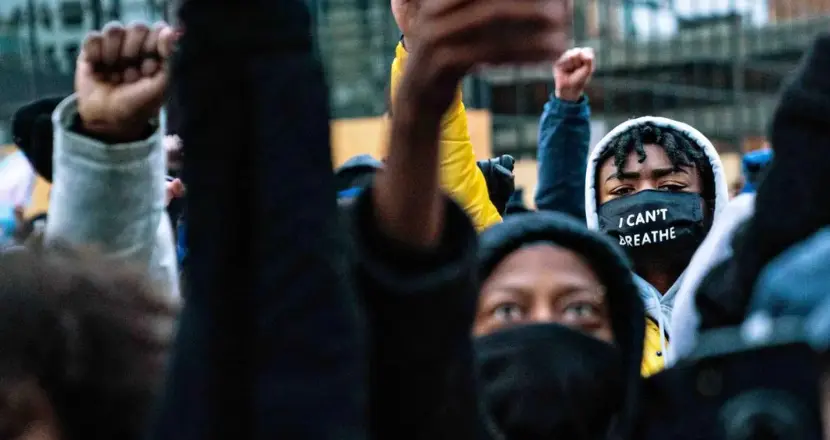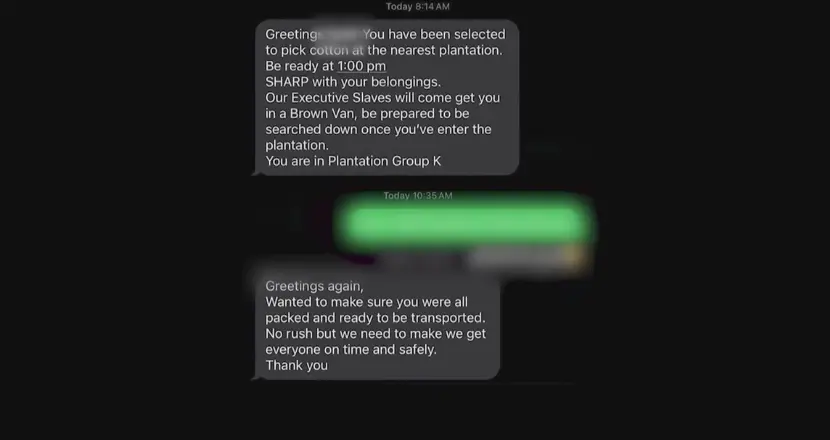Local and federal governments are trying to determine the source of racist text messages sent to Black people all over the country that informed them they were ‘chosen to pick cotton at the nearest plantation.’
The mass texts have been received by children, college students and working professionals from unknown numbers after the presidential election.
The hate-filled rhetoric reminiscent of the country’s painful and bigoted past has been reported in more than 20 states from New York to California, and the District of Columbia.
The NAACP president said on Thursday that there may be more consequences, and both sides of the attorneys general are opposing the messages and promising to find out who is sending them.
“The unfortunate reality of electing a president who, historically, has embraced and at times encouraged hate, is unfolding before our eyes,” NAACP CEO Derrick Johnson said.
“These messages are a disgusting escalation of hate speech from racists groups across the country who feel free to spew hate and fuel the fear that many of us are experiencing after Tuesday’s election.”
The spokesperson of the Donald Trump’s presidential campaign, Karoline Leavitt, said in a statement that the campaign “has absolutely nothing to do with these text messages.”
At least three HBCUs – Hampton University in Hampton, Virginia, Fisk University in Nashville, Tennessee, and Claflin University in Orangeburg, South Carolina – said in statements that their students have received the text messages.
The texts are under investigation by the Federal Communications Commission’s Enforcement Bureau, FCC Chair Jessica Rosenworcel said. “Such messages are prohibited,” she said. “This is the kind of targeting that we consider very seriously.”
The FBI stated that “it is aware of the offensive and racist text messages sent to individuals around the country and is in contact with the Justice Department and other federal authorities on the matter,” the agency said in a statement on Thursday.
Here’s what we know about the origins of the mass text messages and how its recipients were targeted: The source of the texts is unknown There was no information about who sent the messages and there is no list of recipients of the messages.
Some of them seem to have been sent through TextNow in what the company says is a widespread, coordinated attack, it said in a statement to CNN on Friday.
“The moment we woke up to it, our Trust & Safety team swung into action and within an hour, all the related accounts were deactivated,” said the company that allows people to anonymously sign up using an email address and send text messages that look like they are coming from a randomly generated phone number.
TextNow is “collaborating with our industry partners to gather further information and to track and block any new accounts trying to send these messages,” the company said in a statement to CNN on Friday.
“We do not allow our service to be used for sending harassing or spam messages and will cooperate with the authorities to ensure that these people do not use our service to do so in the future.”
The messages ‘seem like robotext messages,’ and the Nevada’s Attorney General’s Office is in touch with the law enforcement agencies to look into the matter, the office stated on X.
The person or people sending the racist text messages are using software to hide their whereabouts, Murrill, the Louisiana Attorney General said to CNN on Friday.
At least some of the messages were sent using an email service routing traffic through Poland, but it does not mean it is where the sender is, the attorney general said.
“They could be coming from Napoleonville, Louisiana, for all we know. We have no idea where they are coming from,” Murrill said. Murrill said Thursday she instructed state investigators “to look into the source of these vile messages that are meant to only sow discord among us.”

The Louisiana Bureau of Investigation is “still trying to trace where everything is actually originating from,” she told CNN.
The attorneys general of Washington, DC, Virginia, New Jersey, Illinois and Maryland have also denounced the messages and encouraged anyone who feels threatened to report to the police.
Texts used proper salutations and greetings The texts sent to CNN and visible on social media include screenshots of the racist messages that were personalized with the recipients’ names.
The senders probably purchased personal data online and entered it and other data into machine learning programs to obtain demographic data, said Cori Faklaris, an assistant professor of software and information services at the University of North Carolina at Charlotte to the Associated Press.
“All of this means it might be easier than most people realize to make a really good guess about the race or ethnicity of the person attached to that phone number,” Faklaris said.
New York Attorney General Letitia James said the texts, which “appear to be targeting Black and brown individuals,” may also include other personal information about the recipient, including their location.
“The person who did this did their homework not only in compiling the names of the targets, but also in the message that contained information that made it look authentic,” said Kenneth Gray a lecturer at the University of New Haven and a retired FBI special agent to CNN affiliate WFSB.
Children and college students as a target group
The racist mass texts were sent to children in middle school, high school, and colleges across the country, and parents were alerted and warned of the psychological effects of the messages.
The Montgomery County Public Schools in Maryland confirmed on Thursday that some of its students received the racist texts. However, as the school board stated, “law enforcement in some areas have announced they consider the messages low-level threats” it recognized the impact of the texts.
“We acknowledge that the mental and social toll on our students, staff, and especially our communities of color is immense,” the school board’s statement says.
“We are with those who have been offended and affected by these actions.” Students at major universities, including the University of Alabama, reported they have received the messages this week.
Black honors freshman Alysa was in tears and wanted to go home after receiving a message that read: “Congratulations you have been selected to pick cotton at the nearest plantation” and “be prepared to be searched down,” said her mother Arleta McCall to CNN. “It is quite shocking that it is the day after the election.
It is rather scary that it came to my daughter’s personal phone. It’s eerie that it’s only going to Black students,” McCall said. “Her group of friends have planned how they are going to get to class so they can walk together and protect each other.”
The texts also went to Black students at Missouri State University, as informed by Missouri NAACP President Nimrod Chapel. “It points to a well organised and resourced group that has decided to attack Americans on our own soil because of the color of our skin,” Chapel said.
CNN affiliates have also said that the racist texts reached students in South Carolina, Massachusetts, Connecticut and Pennsylvania among other states.
“The racist content of these text messages is rather shocking, especially knowing that children are the recipients of such messages,” Lower Merion School District, in Montgomery County, Pennsylvania, acting superintendent Megan Shafer wrote in a letter to parents.
‘I want it to stop,’ grandmother says
When one of the texts appeared on a 12-year-old girl’s phone in Milwaukee, she shared it with her grandmother. You have been lucky to be chosen to go and pick cotton at the nearest plantation.
Kindly ensure that you are packed by ten in the morning. Our executive slaves will pick you up in a yellow van,” the text said, using the girl’s full name, WISN affiliate reported. “That’s the scary part.
“How did they get her name?” the girl’s grandmother Jackie Bradley asked WISN. The girl asked her grandmother if she had received the same text message.
“I was disgusted and very, very it made me very upset because she had to receive that text and she don’t know how to deal with that,” Bradley said. Bradley said she reported the text to the police and the FBI.
“I want it to stop, and I want people to come together and just stop this nonsense,” Bradley said to WISN. “When you are getting kids involved, let alone people of color receiving these texts, but then you send this to a child…It’s not funny at all…I mean, if you have to prosecute somebody, to prosecute them because this is gone too far.”
Surprise and fury across the nation
Talaya Jones of Piscataway, New Jersey, said she was shocked after receiving a racist text on Wednesday that told her she had been “selected to pick cotton at the nearest plantation” and referred to “executive slave catchers,” CNN reported.
“It really just shows that we didn’t come as far as everybody thought we did as a nation, from back in the day when slavery was still a thing,” Jones said.

The text messages take the audience through the period between the early 17th century to the end of the Civil war in 1865, during which up to millions of Africans were transported to the United States to provide forced labor on plantations.
Most were compelled to dwell and toil on plantations cultivating cotton, a crop regarded as one of the most lucrative. They spent many hours picking cotton and suffered from heat, humidity, dirt, untreated diseases, hunger and rape. The slave owners used to sell the enslaved people and this used to lead to the splitting of families.
Slave catchers or slave patrols were legally responsible for policing the slave population. Some of their responsibilities were to chase and recapture runaway slaves and bring them back to their masters, enforcing night bans and flogging and intimidating rebellious or stubborn slaves.
“The threat — and the mention of slavery in 2024 — is not only disturbing but continues the tradition of evil before the Jim Crow era and now to prevent blacks from enjoying the same freedoms to live, to be free and to pursue happiness,” NAACP CEO Johnson said.
That’s when Jones said the sadness began – when they learned young people were receiving the texts, including elementary and middle school students.
“Why would you want to intentionally hurt somebody that you don’t even know?” she said. One Lodi, California resident, Tasha Dunham, said her 16-year-old daughter received a message that read, ‘You are scheduled to go to a plantation in North Carolina.’
“I wasn’t in slavery. My mother wasn’t in slavery. But we are two generations from there.
Thus, if to consider how cruel and evil slavery was for our people, it is terrible and worrying,” Dunham said. Jones also got a text message a day later, an email that addressed her by the N-word and contained a similar message about being “selected to pick cotton.”
“Who is doing this and how are they able to keep coming back?” she asked. You don’t feel safe in anything that you do because you don’t know who is doing it. You just don’t know how far they will be willing to go.”



Thanks for your marvelous posting! I quite enjoyed reading it, you may be a great author.I will
ensure that I bookmark your blog and will eventually come back in the future.
I want to encourage yourself to continue your great writing,
have a nice evening!
Hello Dear,
Thank you so much for your kind words! I’m really glad you enjoyed reading it. Your encouragement means a lot, and I’ll definitely keep working on more content. Wishing you a wonderful evening as well, and I look forward to connecting again in the future!